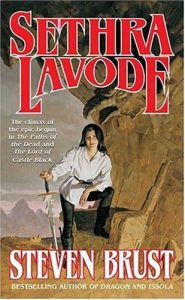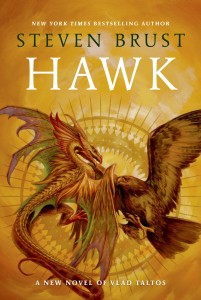 One of the problems with having a booklog is all the books that you had read just before you started chronicling all the books you read, that probably were the very books that led you to say, ‘Hey, there are books out there that people deserve to know about!’, and thus inspired you to get started on such a singularly self-involved project as a booklog. (I know what you’re thinking. ‘You read crap books all the time, nearly constantly in fact, and how dare you pretend that this is something people deserve to know about?’ Well, I do think that very thing, because I have to warn people of the bad stuff too. It’s just that serving as an object lesson wasn’t sufficient impetus, in the way that flagging down the really good books has been.)
One of the problems with having a booklog is all the books that you had read just before you started chronicling all the books you read, that probably were the very books that led you to say, ‘Hey, there are books out there that people deserve to know about!’, and thus inspired you to get started on such a singularly self-involved project as a booklog. (I know what you’re thinking. ‘You read crap books all the time, nearly constantly in fact, and how dare you pretend that this is something people deserve to know about?’ Well, I do think that very thing, because I have to warn people of the bad stuff too. It’s just that serving as an object lesson wasn’t sufficient impetus, in the way that flagging down the really good books has been.)
My point, which I assure you I have one of, is this. I’ve finished the last published Dragaera book, The Enchantress of Dzur Mountain (or as the publisher insisted it be renamed, Sethra Lavode). The author has explored the recent history of this world extensively: in nine first-person books chronicling the rise to prominence, subsequent fall, and so much more of Vlad Taltos, an assassin and businessman in a world where he is a second- or possibly third-class citizen; in a single book that I haven’t yet read about Vlad’s people; and in five books written in the Alexandre Dumas historical style (and in fact directly ripped off from the Three Musketeers and later books, though gradually less directly over the course of the story) about the people in whose world Vlad moves. Sethra Lavode is the final novel of the latter group.
As with the Vlad novels, the voice of the author is the most distinguishing characteristic. In this case, the voice is that of one Sir Paarfi of Roundwood, a historian of no small renown in his own time, who has been at work on the historical cycle for a matter of some three to five centuries. (Dragaerans are a long-lived people.) As with all of the previous novels, I knew essentially how the story must end, and was so able to immerse myself completely in the telling of it. I found that Paarfi has become a much more settled and sedate author, even as his personal life has gotten ever more glamorous and, dare I say, wild. Honestly, I’m not sure I approve. The Paarfi who wrote The Phoenix Guards would never have followed the story so strictly or with so few of the divergences that made him famous in the first place. Still a very good book, just not quite up to the standards I could wish for it to hold.
As for people who have not read any of these books, or few enough of them that my review doesn’t make sense: Sorry about that, and the best thing for you to do is read them, and then see if you agree. I promise, you really do want to.
 After Lyorn, there are two books left in the Vlad Taltos series, and you can really tell. This is a book that is tying up loose ends in an effort to rush headlong toward a finale. But, and here’s the good news: it’s also a book that’s about something besides tying up loose ends.
After Lyorn, there are two books left in the Vlad Taltos series, and you can really tell. This is a book that is tying up loose ends in an effort to rush headlong toward a finale. But, and here’s the good news: it’s also a book that’s about something besides tying up loose ends. The only upside of accidentally reading the newest Vlad Taltos book a year late is that it probably indicates a proportionally shorter wait before the next one. Well, no. There’s also the upside that it’s even harder than in most long series to discuss the Vlad books without spoilers, so yay that anyone I know who cares about them has read this ahead of me, right?
The only upside of accidentally reading the newest Vlad Taltos book a year late is that it probably indicates a proportionally shorter wait before the next one. Well, no. There’s also the upside that it’s even harder than in most long series to discuss the Vlad books without spoilers, so yay that anyone I know who cares about them has read this ahead of me, right? One of the problems with having a booklog is all the books that you had read just before you started chronicling all the books you read, that probably were the very books that led you to say, ‘Hey, there are books out there that people deserve to know about!’, and thus inspired you to get started on such a singularly self-involved project as a booklog. (I know what you’re thinking. ‘You read crap books all the time, nearly constantly in fact, and how dare you pretend that this is something people deserve to know about?’ Well, I do think that very thing, because I have to warn people of the bad stuff too. It’s just that serving as an object lesson wasn’t sufficient impetus, in the way that flagging down the really good books has been.)
One of the problems with having a booklog is all the books that you had read just before you started chronicling all the books you read, that probably were the very books that led you to say, ‘Hey, there are books out there that people deserve to know about!’, and thus inspired you to get started on such a singularly self-involved project as a booklog. (I know what you’re thinking. ‘You read crap books all the time, nearly constantly in fact, and how dare you pretend that this is something people deserve to know about?’ Well, I do think that very thing, because I have to warn people of the bad stuff too. It’s just that serving as an object lesson wasn’t sufficient impetus, in the way that flagging down the really good books has been.)